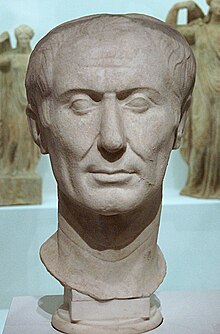C. Julius Caesar
| Julius Caesar IVLIVS CAESAR |
|
|---|---|

The Tusculum portrait, perhaps the only surviving sculpture of Caesar made during his lifetime. Archaeological Museum, Turin, Italy
|
|
| Dictator of the Roman Republic | |
|
In office October 49 BC – 15 March 44 BC |
|
| Consul of the Roman Republic | |
|
In office 1 January 44 BC – 15 March 44 BC Serving with Mark Antony |
|
| Preceded by |
C. Caninius Rebilus (Suffect) and Gaius Trebonius (Suffect) |
| Succeeded by |
P. Cornelius Dolabella (Suffect) and Mark Antony |
|
In office 1 January 46 BC – September 45 BC Serving with M. Aemilius Lepidus (46 BC) |
|
| Preceded by |
Q. Fufius Calenus and Publius Vatinius |
| Succeeded by |
Q. Fabius Maximus (Suffect) and Gaius Trebonius (Suffect) |
|
In office 1 January 48 BC – 1 January 47 BC Serving with P. Servilius Vatia Isauricus |
|
| Preceded by |
C. Claudius Marcellus Maior and L. Cornelius Lentulus Crus |
| Succeeded by |
Q. Fufius Calenus and Publius Vatinius |
|
In office 1 January 59 BC – 1 January 58 BC Serving with Marcus Calpurnius Bibulus |
|
| Preceded by |
Q. Caecilius Metellus Celer and Lucius Afranius |
| Succeeded by |
L. Calpurnius Piso Caesoninus and Aulus Gabinius |
| Personal details | |
| Born |
Gaius Julius Caesar 13 July 100 BC Rome |
| Died | 15 March 44 BC (aged 55) Rome |
| Cause of death | Assassination |
| Resting place | Temple of Caesar, Rome |
| Political party | Populares |
| Spouse(s) | |
| Children | |
| Parents | Gaius Julius Caesar and Aurelia Cotta |
Gaius Julius Caesar (Latin: CAIVS IVLIVS CAESAR, pronounced [ˈɡaː.i.ʊs ˈjuː.li.ʊs ˈkae̯.sar], 13 July 100 BC – 15 March 44 BC), usually called Julius Caesar, was a Roman politician and general who played a critical role in the events that led to the demise of the Roman Republic and the rise of the Roman Empire. He is also known as a notable author of Latin prose.
In 60 BC, Caesar, Crassus, and Pompey formed a political alliance that dominated Roman politics for several years. Their attempts to amass power as Populares were opposed by the Optimates within the Roman Senate, among them Cato the Younger with the frequent support of Cicero. Caesar's victories in the Gallic Wars, completed by 51 BC, extended Rome's territory to the English Channel and the Rhine. Caesar became the first Roman general to cross both the Channel and the Rhine, when he built a bridge across the Rhine and crossed the Channel to invade Britain.
These achievements granted him unmatched military power and threatened to eclipse the standing of Pompey, who had realigned himself with the Senate after the death of Crassus in 53 BC. With the Gallic Wars concluded, the Senate ordered Caesar to step down from his military command and return to Rome. Caesar refused the order, and instead marked his defiance in 49 BC by crossing the Rubicon with the 13th Legion, leaving his province and illegally entering Roman Italy under arms.Civil war resulted, and Caesar's victory in the war put him in an unrivalled position of power and influence.
...
Wikipedia
